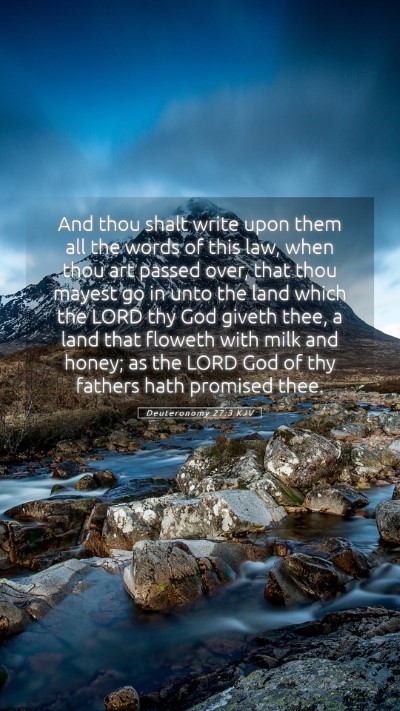Understanding Deuteronomy 27:3
Deuteronomy 27:3 states: "And thou shalt write upon them all the words of this law when thou art passed over, that thou mayest go in unto the land which the LORD thy God giveth thee, a land that floweth with milk and honey; as the LORD God of thy fathers hath promised thee." This verse carries deep meaning and significance, and we will analyze it through the insights of well-established public domain commentaries such as those by Matthew Henry, Albert Barnes, and Adam Clarke.
Bible Verse Meaning
This verse is part of Moses' instructions to the Israelites as they prepared to enter the Promised Land. The directive to write the laws serves a dual purpose: remembrance of God's commandments and the establishment of a covenant with God. The significance lies not only in the act of writing but also in the intention behind it.
Matthew Henry's Commentary
Matthew Henry emphasizes the importance of obedience to God's law as a prerequisite to entering the promised blessings. He notes the emphasis on writing the law, illustrating its permanence and the need for the community to publicly commit to God's commandments. Writing the law serves not only as a reminder to the people but also as a witnessing tool to all nations regarding Israel's unique relationship with God.
Albert Barnes' Commentary
Albert Barnes highlights the historical context of this commandment, understanding that writing the law on stones signifies a formal ratification of the covenant with God. The phrase “a land that floweth with milk and honey” indicates the richness of the Promised Land, a metaphor for God’s abundant blessings. Barnes connects this to the broader theme of God’s faithfulness to His promises, emphasizing that the act of writing signifies acceptance and acknowledgment of the law as pertains to entering a blessed state.
Adam Clarke's Commentary
Adam Clarke elaborates on the specific instructions given about the writing process. He points out the necessity of not only knowing the law but having it inscribed to remind future generations of their required devotion and adherence to God's commands. Clarke notes that this writing represents a public declaration—seen and acknowledged by all as they enter into their inheritance. The land's description (flowing with milk and honey) serves as a divine encouragement towards fidelity, reflecting the goodness of God towards His people.
Key Insights and Applications
- Divine Assurance: The mention of the land flowing with milk and honey serves as a reminder of God’s abundant provision and the blessings that accompany obedience.
- Covenant Relationship: Writing the law demonstrates the commitment Israel was to have towards God, encapsulating their identity as His chosen people.
- Public Acknowledgment: The act of inscribing the law was meant to create a communal understanding of expectations and accountability within the covenant relationship.
Cross References
- Exodus 34:27-28: Reiterates the command for Moses to write the words of the covenant.
- Joshua 8:32: Implements the instruction of writing the law on stones as a part of the covenant renewal.
- Psalm 119:11: Expresses the importance of storing God’s word in one’s heart for guidance and obedience.
Conclusion
The interpretation of Deuteronomy 27:3 provides profound insight into the necessity of adhering to God's laws, showcasing how Bible study insights allow individuals to uncover the layers of meaning in Scripture. This verse encapsulates the themes of remembrance, community commitment, and divine blessings that resonate throughout the Bible. Understanding Scripture, particularly verses such as this, aids in grasping the larger narrative of God’s relationship with His people. Such insights are essential for groups engaging in online Bible study or utilizing various Bible study tools and resources for deeper understanding and application of Scripture in daily life.


